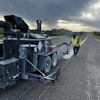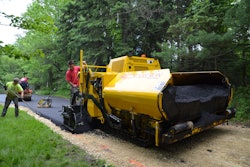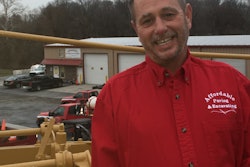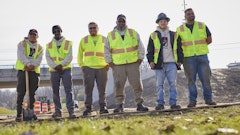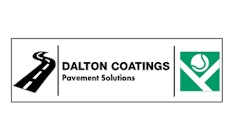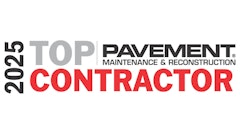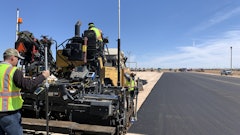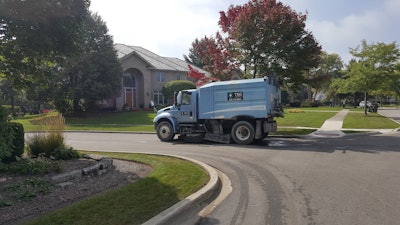
When TKG Environmental Services Group started doing business in 2008, they only swept, and they only swept parking lots. And they were called TKG Sweeping & Services.
But through a canny understanding of their roles in the business, a timely acquisition, and a willingness to transform the company, Rich and Dan Katz now lead a more profitable and more diverse business that still claims at least half its revenue from sweeping.
And Rich Katz, president and co-owner, will tell you, the change came about largely because he and his brother Dan, CEO and co-owner, are not sweeping contractors.
“We’re entrepreneurs,” Rich says. “That means we’re looking to develop a successful, profitable business – not necessarily a sweeping business.”
But a sweeping-focused business is exactly what happened.
Katz says he and CEO and co-owner Dan grew up in a family that was in the real estate business. So while working fulltime at other jobs the two bought and sold several flats in Chicago, until in 2004 they were successful enough to quit their day jobs and concentrate on real estate.
Over four years starting in 2004 they raised roughly $20 million from investors and had bought several shopping centers throughout the Midwest. When the recession hit in 2008, the Katz brothers had to reevaluate what they were doing. One thing they did was buy a parking lot sweeper and start maintaining their own properties.
“It was a way for us to make a little extra money plus we were not happy with the company that was doing the sweeping for us,” Katz says. “We didn’t know if there was a business there when we started sweeping, but we weren’t really concerned with that and we figured if there was one we could figure it out.”
That was the winter of 2008. In 2009 they incorporated TKG Sweeping & Services, providing parking lot sweeping, portering and power washing in southeastern Wisconsin. In April 2009 they received an unexpected phone call. “That’s when we got our first call to bid on another property,” Katz says. “They weren’t happy with the service they were getting so they wanted to know who did our sweeping. And when we told them we handled it ourselves they asked us to bid their property.”
By 2010 TKG Sweeping & Services was getting a steady stream of “Who does your maintenance?” calls – and suddenly they had a sweeping business. Soon TKG owned 10 parking lot sweepers and swept 175 properties with eight trucks heading out every night.
“One advantage we had is that as a property manager I know what property managers are looking for,” Katz says. “And if you’re in real estate you know a lot of people in real estate. So once we realized we had a sweeping business we started calling on people we know, we put logos on the trucks and we put the drivers in uniforms. Things that made us look like a business.”
The two brothers slowly expanded into Chicago through real estate contacts, eventually sweeping 63 Pick’n Saves, Inland and DDR properties and they eventually got the contract doing Mariano’s construction site sweeping as the grocery chain was expanding. In 2010 TKG passed the $1 million mark, and the only marketing they did was an inexpensive website they’d put up after the first few calls came in.
“We quickly became the biggest sweeping company in Wisconsin, partly because we just did a better job,” Katz says. “And we did a better job because we knew what people wanted and we made sure to provide that. Our own properties were always clean and people noticed that and called us. The corners were always clean and the sidewalks were always clean. We pay attention to that.”
Name Change Reflects Overall Goal
In 2011 the entrepreneurial spirit took over. Dan and Rich learned that P & S Sweeping, Crystal Lake, IL, might be up for sale because the owner was looking to retire. They looked into the company and what they discovered was that P & S Sweeping had a substantially different business model than TKG and, though a smaller company, had greater profits.
Among the differences between the two companies were:
- P & S did a lot of daytime work vs. TKG which did primarily night work on parking lots
- P & S focused on big jobs such as large industrial and office properties
- All P & S drivers had CDLs
“P & S was doing 20% or less of retail sweeping and that’s something that really got our attention,” says Katz, adding that at the time TKG was doing 100% retail sweeping. “He was small but he was making money and his profits were greater than ours. He had a great business model.”
Among the reasons P & S was more profitable was that because P & S emphasized sweeping other than retail parking lots they could charge by the hour, which they did on their construction and street sweeping jobs.
“So we bought the company, the owner worked with us for a little while, and we began transforming our business model. We adapted his focus to our business,” Katz says. “So instead of doing 60 Pick’n Saves we started focusing on larger projects that we’d do four or five times a year.”
Katz says the transition was slow but steady. The brothers each took out a second mortgage on their house to support the growth and shift. “We were patient and bought trucks as we needed them. When we had too much work for the trucks we had we bought another truck,” he says. “The shift was done slowly but it was an adjustment.”
In 2012 TKG acquired a roll-off dumpster business, and with that came a number of drivers who had their CDL, which fit well with the company’s new approach. And once they had the dumpster business they developed strong relationships with more construction companies – which opened the door for more non-retail sweeping.
Today TKG employs 24 people and runs 10 regenerative air Elgin and Tymco sweepers (no broom units) and one parking garage sweeper. Half the company’s revenue comes from sweeping and sweeping-related services, while the other half comes from renting roll-off dumpsters to contractors. Retail sweeping accounts for less than 5% of sales. The company generates 25% of sales from construction-site sweeping, 25% of sales from municipal sweeping, and 45% from larger projects such as industrial parks, office complexes and construction sites.
“We kept retail for a long time just to ease the transition,” Katz says. “For shopping center work we billed the first of every month and so we were always getting paid. There was always steady money coming in. The net profit on retail sweeping is small but it’s regular. The net profit on other types of jobs is larger but irregular and not guaranteed.”
Then they changed the name to TKG Environmental Services because “we realized everything we do is to improve the environment so the name made sense. Our goal is to direct as much as possible away from the landfills, to keep it out of the air and water,” Katz says. “There’s always going to be garbage but if we can divert 70-80% of that from landfills that makes a real impact. And that’s what we think we can do.”
To that end TKG acquired in 2012 a recycling business, American Recycling, but that business was closed in 2015 when it simply became too successful. “We needed a bigger site because we were getting overloaded and we couldn’t handle the volume,” Katz says. They scouted new locations and after construction delays the recycling aspect of the business should be opened by the end of 2017.
“We actually think the recycling will become the biggest piece of our business. We expect it to gross what sweeping and dumpsters combined do within 3 years.”
The Value of Identifying Core Values
As they changed the focus of the company, Rich and Dan realized that they were going to have to make additional, perhaps more difficult, changes as well: They needed to change the culture and they needed to hire “the right people” or move people within the company into positions that could best use their talents.
“Our goal was to get the right people so we can worry about the operation and so Dan and I can worry about everything else and the future. This year we’ve been focused on getting the right person in the right seat,” Katz says.
So TKG hired a consultant, Sean McDermott, McDermott Group, to help evaluate what they needed to change and to put together a process to implement those changes.
“We needed to find out what we needed to do to grow the business, as opposed to what we needed to do to maintain the business,” Katz says. “We learned that the Number One thing you have to do is get the right people in the right seat and we realized we had a hard time growing because people were not in the right seat. In a couple of cases we had the right people, they just weren’t in the right seat.”
Upon evaluation Katz says TKG identified “a laundry list of problems” but once they examined them more closely all signs pointed to:
- An operations manager who was not doing a good job
- Drivers that didn’t embrace the new approach
Then they developed a strategic plan to address those and other problems. The plan, Katz admits, drastically changed the company’s culture, but if they were going to grow, he says, the culture had to change.
Katz says their first action item was to eliminate overtime. That ruffled some feathers because people were accustomed to overtime pay and liked the extra cash. “We were getting work done but we were paying 30% overtime because we had an operations manager who didn’t want to hold people accountable,” Katz says. “But 30% overtime takes a big bite out of profits and limits growth opportunities. So OT had to go. We decided either we need to get the manager to manage or change the manager.”
Closely tied to the reason TKG was paying so much overtime, they determined, was the fact that the company hadn’t established a set of core values they wanted in the people they employed. By identifying the values TKG wanted all its employees to have, the company is now better able to see who does or doesn’t fit in and who will or won’t fit in among new hires.
Those core values include people who:
- Good Honest People
- Strong Desire to Succeed
- Teamwork
- Respects Customers and Peers
“The culture overall has changed drastically,” Katz says. “But Dan and I are very clear about where we want to go and we’ve structured the company to get there. We explained that to everyone and reviewed everyone and let them know where we thought they fit in and where we think they could improve.”
Not surprisingly, some people balked, including the operations manager and some drivers. The operations manager quit because, Katz says, “He realized he wasn’t going to do it. And we didn’t lose a beat when he left because he just wasn’t managing when he was here.”
That opened the door for the management changes TKG has been making over the last year. John Cox, a former truck driver who is in his fifth year with TKG, was named director of operations in April after being named the head of Maintenance in 2016. Katie Stayman, who had been assistant to the driver manager, was named manager of drivers/operations/scheduling after only two years with the company. In addition TKG hired a dispatcher, Jesenia Presley, who handles both roll-off dumpsters and sweeping; an additional accountant, Tracy Lesniewicz; and Dean Cirulis, the company’s first full-time business development/sales manager.
Drivers Held Accountable
TKG also sat down with each driver and outlined changes for operators. One of the first things TKG implemented was a four-day, 40-hour work week so drivers worked 10 hours a day. This all but eliminated overtime, and while Katz says most drivers embraced the change, some did not (two drivers quit). Other changes include:
- Allowing only 30 minutes for pre-trip preparation. “Some drivers were able to do it in 30 minutes so why can’t all of them? Why were some people take 60 minutes?”
- Drivers must clean the truck every day
- Drivers must empty the truck of debris every day
- A 10% increase in pay for drivers with a CDL. “We started paying more to try to get better people in here and it seems to have worked,” Katz says. “We’ve found that that increase is getting us more people coming through the door.”
In addition, TKG changed from paperwork dispatch to all-phone dispatch, which Katz says drivers on the whole don’t like.
“They don’t like being tracked -- and it does track them -- but that’s too bad,” he says. “If they’re doing what they should be doing then there’s no issue at all. Now we know where people are all the time.”
Recently TKG’s tracking showed a driver six miles out of his way -- and he was fired.
“If you’re lost and you can’t find your way you need to call in and let us know so we can help. If you make a mistake on a job we’re not going to be happy about it but those things happen,” Katz says. “But if you’re doing something you shouldn’t be doing or driving in an area where you’re not supposed to be, that’s something we’re not going to put up with.
“We don’t want people here who are not willing to work and not willing to work with our management, so we’re very quick to fire. If you’re six miles out of your way and you don’t call in, you aren’t willing to work.
“We’re nice guys, we really are. But that doesn’t mean you can come in here and not do your job,” Katz says. “It’s a good culture as long as you show up on time and are accountable for what you do.”


